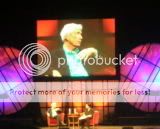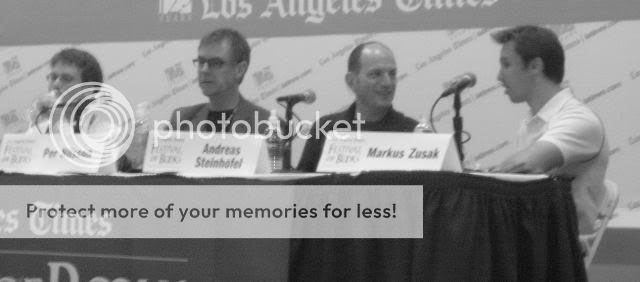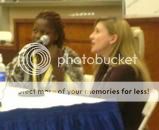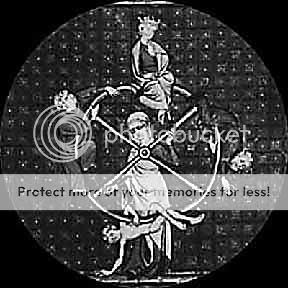The Los Angeles Times’ Festival of Books laid out a banquet of ideas for readers and writers alike — food for this book-lover’s soul. Here are several tasty tidbits I picked up from four sessions I attended, served up by the writers I heard.
Frank McCourt in Conversation with Mitch Albom

Left to Right: Frank McCourt, Mitch Albom. McCourt’s on the big screen.
Frank McCourt (Angela’s Ashes, Teacher Man):
“Before you read a Faulkner sentence, wave goodbye to your family.”
“Students’ eyes tell you if you’re reaching them; on the other hand, for a writer, it’s only you and your words, at your desk.”
Mitch Albom: “I got numerous rejections for Tuesdays with Morrie. Several editors told me I didn’t know how to write a memoir, and [one editor] told me I didn’t even know what a memoir was.”
Young Adult Fiction: Rites of Initiation

Left to Right: John Green, Per Nilsson, Andreas Steinhöfel, and Markus Zusak
On writing:
Per “made up a lie that has become the truth” about his roots as a writer. He said he started writing so he could tell his kids who he was as a 12-year-old –- how he’d spent his time “walking aimlessly while daydreaming about being a hero, an idol, a secret agent.” As well, he wanted his son to know how he coped when he “collided with the real world,” when metaphorical “lampposts sprang up out of nowhere.”
Andreas wrote three chapters of a novel at age 16. He quickly figured out that it was “terrible,” but “that realization proved I could be a writer, that I had a keen editorial eye.”
John says “I’m good at two things: telling lies and sitting. And that’s what a writer does.” John also said that
*Looking for Alaska, in its Dutch translation, is called The Great Perhaps. That title wouldn’t work here, John says, because “Americans are not in the business of abstraction.”
*Defining YA is dangerous business. It’s really a matter of where publishers think books will sell. Unfortunately, sometimes publishers underestimate kids. They’re not fools. They’re not going to take any rubbish.”
*”It’s a false premise that every idiot can write for an undeveloped person. Writers need to have a good story.”
*“YA novels grapple with important issues. They’re different from books written for adults in that they’re usually not layered in irony; [instead], they’re written in a simple, unadorned, serious, and thoughtful way.”
Markus said, “The books I love transcend categories. That’s what I’m striving for.” He also said that “People never come up and say “I love your junior/fantasy/crossover young adult book. I don’t care what they call it; I just hope they compliment me on the story.”
On writing about death:
Per: “When you’re 16, you think about things, and you carry your 16-year-old the rest of your life. If you think about your own life, you can’t avoid thinking about death.”
Andreas: “It’s a great way to get rid of characters you don’t need any more. Every death means there’s a new beginning in store.”
John: “It’s extraordinarily likely that everyone in this room will die. Historically, it doesn’t look good for us. At 16, I was aware of mortality and frailty of this state we’re in. In the face of death, we can find and sustain hope.”
Marcus: “There’s no bigger story than death, so it’s natural that we end up there as writers sometimes.”
The challenge of plotting and character development:
Andreas: “I love chapter headings almost as much as John loves famous last words. I make long lists of chapter headings until I feel I’m ready to write.”
Per: Writing about contemporary teens “isn’t difficult” because “it’s about having an active imagination. I’m not writing about American Idol; I’m writing about feelings. Characters and situations come out of an active imagination.”
John: “My favorite part of writing is having written. When characters are alive for me, there’s nothing like it. I keep trying to get back to that feeling.”
Devil in the Details: Quirky Nonfiction

Left to Right: Veronica Chambers and June Casagrande
June (Grammar Snobs are Great Big Meanies) gave advice to punctuation challenged writers: “Only communicate via text message. No one will know you don’t know the difference.”
Martin (Oops: Twenty Life Lessons from the Fiascos that Shaped America): “Write from the inside out, rather than the outside in. Figure out what you want to say about the topic, and then begin to write.”
Veronica (The Joy of Doing Things Badly): “Consider first writing an article for a magazine, so you can show audience interest in your topic when you decide to write a book.”
Creating New Worlds: Young Adult Fantasy Writing

Left to Right: Margo Lanagan, Adam Gopnik, Cornelia Funke, and Moderator Denise Hamilton
Random thoughts:
Unanimously, the panelists recommended T.H. White as their favorite YA fantasy author. They gave their highest praise to White’s Once and Future King.
All four agreed that the publishing industry has a slight air of condescension about YA novels; however, the positive side of writing for this genre, they said, is that authors can develop an intimate relationship with a particular age of readers.
These panelists emphasized the importance of developing originality in voice and plot. They warned against the dangers of “patterning” that writers might pick up in a formal writing program.
On writing:
Adam’s son, aged 9, is his test audience. His response to the first draft of his dad’s latest book? “It’s cool, Dad, but could you just bring the cool bits a bit closer together?” This is a constant challenge a writer faces, Adam said; it’s what an editor might say. So that bit of advice from his son guides Adam’s writing to this day.
*“To be a successful writer,” Adam says, “you must translate the mental task into a physical task. Don’t ask, ‘Can I write magical books?’ Instead, ask, ‘Can I sit for __ hours and get ___ words down on the page?'”
*Adam says “It’s important for me that my books teach kids that the dignity of logic is greater than the glory of magic.”
Cornelia: “Fantasy allows a writer to take common problems and clad them in something else. This allows readers to see them much more clearly and perhaps deal with them in a more effective and interesting way.”
“YA fantasy fiction is sometimes entertainment engineered by publishers who want something written to formula.”
Margo: “A certain amount of composting of life that has to go on before you’re ready to write.” You’re a more effective and interesting writer, she says, if you have a variety of experiences that are not writing-instruction related. “If you rely too much on critiques and programs of instruction,” she suggests, “your writing becomes circular and stale.”
And from today’s LA TImes: “[If] publishers looked to their own childhood memories rather than a spreadsheet, they’d recall that young readers, more than any others, want to be transported and shown not just other lives but whole worlds utterly different from their own. Witness the wild popularity of fantasy and science fiction among the very same kids who display the very same sensibility in their choice of video games. What could be more dispiriting than going into your room in search of escape, solace or pleasure, opening a book and reading a story about someone just like you hemmed in by the same four walls?”








